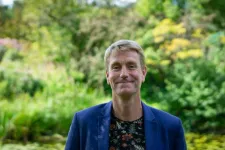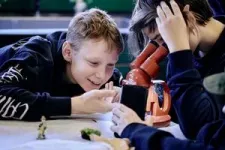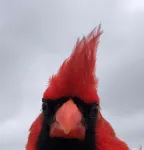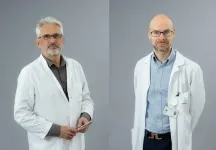(Press-News.org) There is a growing interest in incorporating assistance from private citizens into scientific projects globally. Nonetheless, it seems that Anders P. Tøttrup, an Associate Professor at the Natural History Museum of Denmark, might become the world's first professor in Citizen Science.
Anders P. Tøttrup is a trained biologist and leads the section for Citizen Science projects at the Natural History Museum of Denmark. These projects involve scientific endeavours in which citizens are invited to assist in collecting and analyzing data. Now, the Museum is taking a step further as Anders P. Tøttrup enters a 'professor track.' The goal is to establish a new professorship in Citizen Science at the museum.
Peter C. Kjærgaard, Director of the Natural History Museum of Denmark, sees this as an important step in creating better conditions for an increasingly important aspect of scientific work.
"Citizen Science plays an expanding role in numerous projects. When students, associations, and nature enthusiasts collect data year-round across the country, scientists gain unique knowledge that would be otherwise unattainable. This is crucial, especially today, as the climate crisis and human impact bring about significant changes in nature. Additionally, it democratizes our research efforts. That's why we've chosen to make Citizen Science an even more central part of our science by establishing a professorship that focuses on how best to utilize the valuable resources provided by fellow citizens," says Peter C. Kjærgaard. The Museum has actively engaged in Citizen Science for many years, and Anders P. Tøttrup's section has led numerous projects that have expanded the horizons of what scientists can achieve, including collaborations with citizens, primary and high school students, and associations.
"I am very pleased with the opportunity to place extra emphasis on Citizen Science. I will work on developing new projects as well as 'the Science of Citizen Science.' This entails researching how we can create frameworks that appeal to an even more diverse range of groups interested in assisting us with research, as well as ensuring that the data we collect is of high quality and is made accessible to other scientists," says Anders P. Tøttrup.
He sees significant potential in opening universities to Citizen Science, as it yields better results for science itself. Furthermore, participation in projects increases public trust in science and the results produced by scientists. When the public assists the scientists, entirely new research opportunities emerge, fostering greater interest in science and providing a stronger defense against 'fake news.'
"This is an important factor because we are increasingly surrounded by misinformation that manipulates attitudes and trends in society. Citizen Science contributes to establishing a strong foundation of trust in science. Simultaneously, we can see that those who participate in the projects develop a greater interest in natural science. This is especially important among young people, who are expected to be the next generation of researchers," says Anders P. Tøttrup.
It is not just researchers who recognize the great potential of having citizens help collect important knowledge. Anders P. Tøttrup has seen a growing interest in supporting these projects from many private foundations in the field of natural science.
"Many Danish private foundations are very progressive, and they have recognized that the projects are deeply serious, and the results we achieve are completely central when we need to collect and examine large amounts of material. At the same time, we are also forming closer collaborations with associations and environmental organizations, which see an opportunity to provide their members with a good experience while contributing to a better understanding of the state of nature. We have only scratched the surface of possibilities, so I am very much looking forward to continuing the work in an incredibly exciting scientific area," concludes Anders P. Tøttrup.
END
Citizen Science receives a significant boost
Despite the increasing worldwide interest in citizen science, research into the concept itself remains limited. This is the issue a new professorship, possibly the first of its kind worldwide, aims to address
2023-09-20
ELSE PRESS RELEASES FROM THIS DATE:
Urban light pollution linked to smaller eyes in birds
2023-09-20
PULLMAN, Wash. – The bright lights of big cities could be causing an evolutionary adaptation for smaller eyes in some birds, a new study indicates.
Researchers found that two common songbirds, the Northern Cardinal and Carolina Wren, that live year-round in the urban core of San Antonio, Texas, had eyes about 5% smaller than members of the same species from the less bright outskirts. Researchers found no eye-size difference for two species of migratory birds, the Painted Bunting and White-eyed Vireo, no matter which part of the city ...
Novel organic light-emitting diode with ultralow turn-on voltage for blue emission
2023-09-20
An upconversion organic light-emitting diode (OLED) based on a typical blue-fluorescence emitter achieves emission at an ultralow turn-on voltage of 1.47 V, as demonstrated by researchers from Tokyo Tech. Their technology circumvents the traditional high voltage requirement for blue OLEDs, leading to potential advancements in commercial smartphone and large screen displays.
Blue light is vital for light-emitting devices, lighting applications, as well as smartphone screens and large screen displays. However, it is challenging to develop efficient blue organic light-emitting diodes (OLEDs) ...
Canadian older adults with COPD faced high levels of depression during the COVID pandemic
2023-09-20
A new longitudinal study published online in the International Journal of Chronic Obstructive Pulmonary Disease found that older adults with COPD had a heightened risk of depression during the early stages of the COVID-19 pandemic.
Researchers examined a sample of 875 individuals with COPD from the Canadian Longitudinal Study on Aging, a national study of Canadian older adults. Using longitudinal data, researchers were able to differentiate between 369 respondents with COPD who had a pre-pandemic history of depression and 506 respondents who had never experienced ...
Targeting Epstein-Barr virus to treat and prevent MS
2023-09-20
Recent evidence strongly implicates infection by the Epstein-Barr virus (EBV) as the trigger for development of multiple sclerosis (MS). An international research team is now gathering to unveil the role of EBV in the onset and progression of the MS disease.
The team has ambitious goals:
“We aim to find out why only a few EBV infected people develop MS, and define the underlying mechanism of this process”, explains the principal investigator (PI), Professor Kjell-Morten Myhr of the University of Bergen.
“Our research will also seek to investigate if targeting the EBV infection with antiviral treatments can improve the disease course or even stop ...
Can cognitive-behavioral therapy lessen fibromyalgia pain?
2023-09-20
In a recent randomized clinical trial of patients with fibromyalgia, cognitive-behavioral therapy (CBT)—which uses structured techniques to alter distorted thoughts and negative moods—was superior to a matched education treatment in reducing the interfering effects of pain and other aspects of fibromyalgia on daily living.
Within the group that received CBT in the trial, which is published in Arthritis & Rheumatology, improvements were at least partly attributable to reductions in what’s known as catastrophizing, a state comprised of cognitive and emotional processes such as helplessness, rumination, and magnification of ...
Can creatine supplements help people suffering from post-COVID-19 fatigue?
2023-09-20
The amino acid creatine is essential for muscle and brain health, and people commonly use creatine supplements to improve exercise performance and increase muscle mass. Results from a recent clinical trial published in Food Science & Nutrition indicate that dietary creatine may also benefit individuals experiencing post-COVID-19 fatigue syndrome (also known as long COVID).
In the trial, 12 people with post-COVID-19 fatigue syndrome were randomized to take a placebo or 4 grams of creatine monohydrate per day for ...
How will sea level rise affect the health of freshwater mussels and other salt-sensitive species?
2023-09-20
Investigators recently studied several species of freshwater mussels, which are endangered and are especially sensitive to changes in water quality, to explore the ramifications of sea-level rise in coastal rivers. The research published in Environmental Toxicology and Chemistry determined the concentration of sea salt that would harm the viability of young mussels.
The study focused on the ecosystems along the southeastern US coast, where sea-level measurements have indicated rising waters from 2 to 6mm per year. By detailing the levels in which salt water is toxic to mussels at various life stages, the results can provide guidance for conservation programs ...
Can artificial intelligence predict the risk of dying in the years following a hip fracture?
2023-09-20
A new study published in the Journal of Orthopaedic Research indicates that an artificial intelligence–based model trained on basic blood and lab test data as well as basic demographic data can predict a patient’s risk of death within 1-, 5-, and 10-years of experiencing a hip fracture.
In the analysis of 3,751 hip fracture patient records from two in‐hospital database systems at the Beth Israel Deaconess Medical Center in Boston, the 1‐year mortality rate for all patients was 21% and for those aged 80 years and older was 29%. After assessing 10 different machine learning classification ...
Study reveals the most important considerations for grizzly bear conservation
2023-09-20
Humans negatively impact the health of grizzly bear populations through top-down influences like direct mortality associated with forestry roads (from conflict or illegal killings) and displacement from high quality habitats, and through bottom-up influences like reducing availability of food resources. Research published in Wildlife Monographs reveals the relationship between these forces, informing a strategic conservation program.
Investigators radio-collared and followed numerous grizzly bears over multiple years in southeastern British Columbia. They found an interesting interplay between the most important bottom-up factor, ...
Cognitive behavioral therapy eases how fibromyalgia pain is experienced by the brain
2023-09-20
Patients living with fibromyalgia (FM) – a disease that predominantly affects women and is characterized by chronic pain, fatigue and brain fog – often find limited treatment options and a scarcity of explanations for their symptoms. Research led by Mass General Brigham investigators has found that cognitive behavioral therapy (CBT) can significantly reduce the burden of FM by, in part, reducing pain-catastrophizing, a negative cognitive and emotional response that can intensify pain through feelings of helplessness, rumination and intrusive thoughts. This finding is backed by neuroimaging ...
LAST 30 PRESS RELEASES:
Jeonbuk National University researchers explore metal oxide electrodes as a new frontier in electrochemical microplastic detection
Cannabis: What is the profile of adults at low risk of dependence?
Medical and materials innovations of two women engineers recognized by Sony and Nature
Blood test “clocks” predict when Alzheimer’s symptoms will start
Second pregnancy uniquely alters the female brain
Study shows low-field MRI is feasible for breast screening
Nanodevice produces continuous electricity from evaporation
Call me invasive: New evidence confirms the status of the giant Asian mantis in Europe
Scientists discover a key mechanism regulating how oxytocin is released in the mouse brain
Public and patient involvement in research is a balancing act of power
Scientists discover “bacterial constipation,” a new disease caused by gut-drying bacteria
DGIST identifies “magic blueprint” for converting carbon dioxide into resources through atom-level catalyst design
COVID-19 vaccination during pregnancy may help prevent preeclampsia
Menopausal hormone therapy not linked to increased risk of death
Chronic shortage of family doctors in England, reveals BMJ analysis
Booster jabs reduce the risks of COVID-19 deaths, study finds
Screening increases survival rate for stage IV breast cancer by 60%
ACC announces inaugural fellow for the Thad and Gerry Waites Rural Cardiovascular Research Fellowship
University of Oklahoma researchers develop durable hybrid materials for faster radiation detection
Medicaid disenrollment spikes at age 19, study finds
Turning agricultural waste into advanced materials: Review highlights how torrefaction could power a sustainable carbon future
New study warns emerging pollutants in livestock and aquaculture waste may threaten ecosystems and public health
Integrated rice–aquatic farming systems may hold the key to smarter nitrogen use and lower agricultural emissions
Hope for global banana farming in genetic discovery
Mirror image pheromones help beetles swipe right
Prenatal lead exposure related to worse cognitive function in adults
Research alert: Understanding substance use across the full spectrum of sexual identity
Pekingese, Shih Tzu and Staffordshire Bull Terrier among twelve dog breeds at risk of serious breathing condition
Selected dog breeds with most breathing trouble identified in new study
Interplay of class and gender may influence social judgments differently between cultures
[Press-News.org] Citizen Science receives a significant boostDespite the increasing worldwide interest in citizen science, research into the concept itself remains limited. This is the issue a new professorship, possibly the first of its kind worldwide, aims to address




